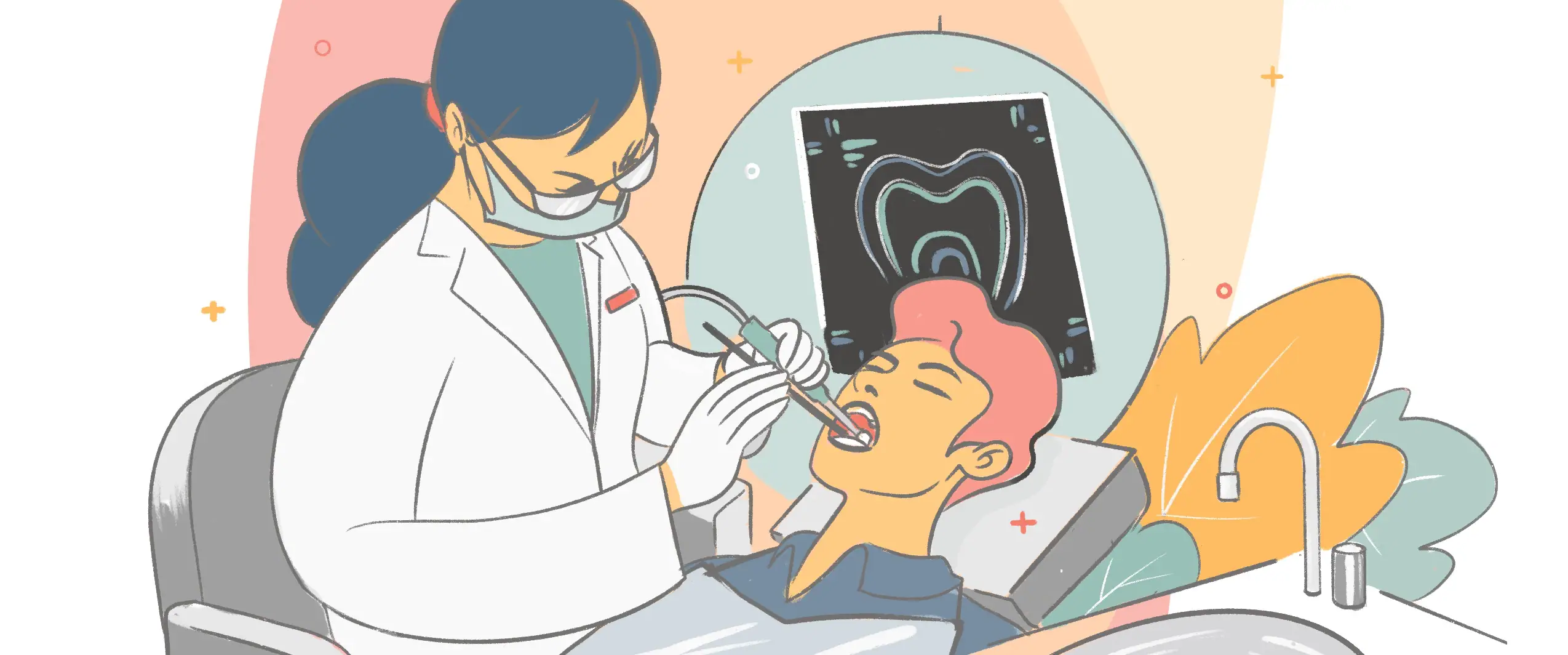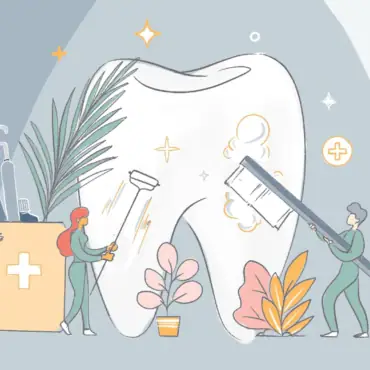There’s more to a tooth falling out than the tooth fairy leaving money under your pillow. Unfortunately, gone are the days of an under-the-pillow payout. But how much does a tooth extraction cost? Let’s look at that.
What is tooth extraction?
Tooth extraction is the complete removal of a tooth from the mouth by a dentist. The most common reason is the extraction of impacted wisdom teeth. Other reasons include tooth decay, infection, trauma, and crowding.
Patients who require braces may need one or two teeth extracted to create space for their other teeth as they shift into place. This is a relatively straightforward procedure, especially when the teeth are visible. Impacted teeth do require a bit more effort. And while most extractions are relatively quick and painless procedures, patients will likely experience some discomfort during and after their procedure, despite local anesthesia or sedatives.
When should a tooth be extracted?
This is often your dentist’s call. They decide when a problem can be successfully managed without extraction and when the tooth must be pulled. The patient also has to exhibit symptoms showing that an extraction is needed.
Common symptoms include:
- Redness and swelling of the gums
- Pain around the gums or the jawbone
- Headaches
- Difficulty chewing
- Difficulty speaking
- Unpleasant smell from the mouth
These can either be signs of an impacted tooth or a tooth infection or decay. Also, if a tooth is damaged and the trauma cannot be repaired with a crown, a dentist might recommend an extraction.
An x-ray is often performed so the dentist has a clearer picture of what’s going on to make an informed decision. This can also affect the tooth extraction cost.
What happens when you get a tooth pulled?
Immediately after the procedure, you might be too numb or groggy from the anesthesia to feel any pain, but do try to keep the gauze pad in place for about three hours afterward.
A blood clot will form in the socket where the tooth was extracted. Don’t spit forcefully, since dislodging the clot can lead to painful dry socket and further complications. As for the swelling, an ice pack should help. Your dentist will likely ask you to do a salt-and-warm-water gargle after 24 hours and may also prescribe pain meds to manage the discomfort.
Make sure to follow all the instructions from your dentist religiously; it’s easier to prevent complications than to treat them. Recovery takes a few days to a few weeks.
Is tooth extraction painful?
The extraction procedure itself is often more uncomfortable than painful. The dentist will determine the type of anesthesia to use depending on your pain threshold and the complexity of the procedure, so you’ll never feel too much of what’s happening in your mouth. Local anesthesia is most commonly used, but general anesthesia or sedation can be used as well.
After the medicine wears off it’s normal to experience pain, but an ice pack and some pain meds will help you deal with the discomfort.
How can I prepare for a tooth extraction?
Other than requesting an x-ray, your dentist will ask for your medical history. Be sure to let them know if you have any medical conditions or if you’re taking any medications. Also, avoid smoking and eating or drinking 6 to 8 hours before the procedure.
Sign up for our newsletter.
Just let us know a bit about yourself.
And definitely make arrangements for someone to come with you to the clinic and also drive you home, especially if you’ll be put under general anesthesia.
What are the risks of a tooth extraction?
Some common post-surgical complications of tooth extractions include pain, inflammation, bruising, bleeding, and infection. However, these can be managed with anti-inflammatory medicine, analgesic medicine, and antibiotics prescribed by a dentist.
Prolonged bleeding and infection are less common but worrisome nonetheless. If this happens, your dentist will determine the cause and treat it appropriately. Other less common risks are improper teeth alignment, bite collapse, delayed healing, dry socket, nerve injury, and maxillary sinus exposure.
Measures will be put in place to ensure your tooth extraction is as risk-free as possible. Also, post-op appointments with your dentist are invaluable in minimizing these risks and adequately treating them if they do occur.
How long does it take to recover from a tooth extraction?
This depends on the patient, the type of extraction and the location of the tooth. Generally, most extractions will heal in 7 to 10 days. Keeping the blood clot in place will help the healing process, since dislodging it can cause bleeding and quite possibly an infection, thereby taking longer to heal.
How much does a tooth extraction cost?
The cost of a tooth extraction depends on the type of extraction, whether simple or surgical, but is usually somewhere between $200 and $400. Other factors such as the type of anesthesia you need, the area the dental clinic is located in, and the type of extraction:
Simple extraction
This is a routine procedure that involves the removal of visible teeth. With local anesthesia and minimal equipment, this procedure can be carried out in a fairly short time.
Due for a checkup?
Find a top rated dentist near you that takes your insurance.
An elevator and forceps are used to elevate and grip the tooth. Then, the dentist usually applies a controlled level of force to move the tooth back-and-forth until the periodontal ligament breaks enough to loosen the tooth sufficiently from the alveolar bone so it can be removed.
There’s no need to worry about the moving back-and-forth or pulling, since the area will be sufficiently numbed to minimize any pain and discomfort.
Reasons for a simple extraction include an erupted tooth, normal placement of the tooth in the jaw bone, and when the tooth has missing parts due to trauma or decay.
Any of the above conditions will likely require a tooth extraction. The cost of the procedure includes the anesthesia, the sutures if needed, and of course, the procedure itself. X-rays are not always necessary.
The total costs can range between $50 and $500, but on average it’s $200. A simple extraction with a dental exam, periapical X-Ray, and some nitrous oxide (laughing gas) will typically cost around $450.
Surgical extraction
This involves the removal of teeth that are not easily accessible in the mouth. Partially erupted or occluded teeth are common indications for this procedure. Also, teeth that are fractured under the gum line will require surgery.
Due for a checkup?
Find a top rated dentist near you that takes your insurance.
The teeth often require an incision into the connective tissue or some prior surgical manipulation before they can be successfully extracted.
The price of a surgical extraction ranges from $200 and $700, with an average cost of $300. However, the extraction of impacted teeth can reach as high as $1,000 ($450 on average). When the tooth is broken below the gum line, you can expect to pay between $200 and $600 – about $350 on average.
Is tooth extraction covered by insurance?
Dental procedures are considered either routine or an emergency. Either way, they can make a huge dent in your bank account. The good news is that unlike cosmetic dental procedures such as teeth whitening, tooth extraction is covered by dental insurance.
As of 2016, 77% of Americans (249.1 million people) had dental insurance which, on average, costs about $360 a year ($15 to $50 per month). This insurance typically covers 100% of preventative care, 80% of basic procedures, and 50% of major procedures.
Where can I get a tooth extraction near me?
If you don’t have a go-to dentist, we recommend you find one for emergencies and routine checkups as soon as possible. With Opencare, you can get the help you need to find a dentist near you. All you have to do is take our quiz, and get pointed towards the perfect dentist for your specific needs. Then, book a dentist’s appointment with the dentist and request a consultation.
Tooth extractions are scarier than they are painful. Find a dentist you can trust, and the process should go smoothly.
Due for a checkup?
Find a top rated dentist near you that takes your insurance.








